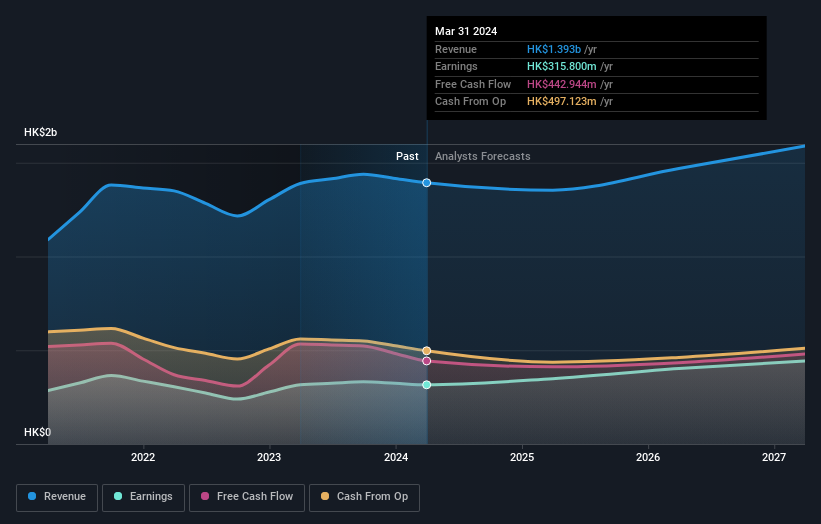
The analyst might have been a bit too bullish on Perfect Medical Health Management Limited (HKG:1830), given that the company fell short of expectations when it released its full-year results last week. Perfect Medical Health Management missed analyst forecasts, with revenues of HK$1.4b and statutory earnings per share (EPS) of HK$0.25, falling short by 2.4% and 8.9% respectively. This is an important time for investors, as they can track a company's performance in its report, look at what expert is forecasting for next year, and see if there has been any change to expectations for the business. With this in mind, we've gathered the latest statutory forecasts to see what the analyst is expecting for next year.
See our latest analysis for Perfect Medical Health Management

After the latest results, the consensus from Perfect Medical Health Management's solitary analyst is for revenues of HK$1.35b in 2025, which would reflect a measurable 2.8% decline in revenue compared to the last year of performance. Statutory earnings per share are predicted to climb 11% to HK$0.28. Yet prior to the latest earnings, the analyst had been anticipated revenues of HK$1.56b and earnings per share (EPS) of HK$0.32 in 2025. Indeed, we can see that the analyst is a lot more bearish about Perfect Medical Health Management's prospects following the latest results, administering a real cut to revenue estimates and slashing their EPS estimates to boot.
The consensus price target fell 7.5% to HK$4.05, with the weaker earnings outlook clearly leading valuation estimates.
One way to get more context on these forecasts is to look at how they compare to both past performance, and how other companies in the same industry are performing. These estimates imply that revenue is expected to slow, with a forecast annualised decline of 2.8% by the end of 2025. This indicates a significant reduction from annual growth of 3.7% over the last five years. By contrast, our data suggests that other companies (with analyst coverage) in the same industry are forecast to see their revenue grow 15% annually for the foreseeable future. It's pretty clear that Perfect Medical Health Management's revenues are expected to perform substantially worse than the wider industry.
The Bottom Line
The biggest concern is that the analyst reduced their earnings per share estimates, suggesting business headwinds could lay ahead for Perfect Medical Health Management. Unfortunately, they also downgraded their revenue estimates, and our data indicates underperformance compared to the wider industry. Even so, earnings per share are more important to the intrinsic value of the business. Furthermore, the analyst also cut their price targets, suggesting that the latest news has led to greater pessimism about the intrinsic value of the business.
Following on from that line of thought, we think that the long-term prospects of the business are much more relevant than next year's earnings. We have analyst estimates for Perfect Medical Health Management going out as far as 2027, and you can see them free on our platform here.
And what about risks? Every company has them, and we've spotted 1 warning sign for Perfect Medical Health Management you should know about.
Have feedback on this article? Concerned about the content? Get in touch with us directly. Alternatively, email editorial-team (at) simplywallst.com.
This article by Simply Wall St is general in nature. We provide commentary based on historical data and analyst forecasts only using an unbiased methodology and our articles are not intended to be financial advice. It does not constitute a recommendation to buy or sell any stock, and does not take account of your objectives, or your financial situation. We aim to bring you long-term focused analysis driven by fundamental data. Note that our analysis may not factor in the latest price-sensitive company announcements or qualitative material. Simply Wall St has no position in any stocks mentioned.
Have feedback on this article? Concerned about the content? Get in touch with us directly. Alternatively, email editorial-team@simplywallst.com